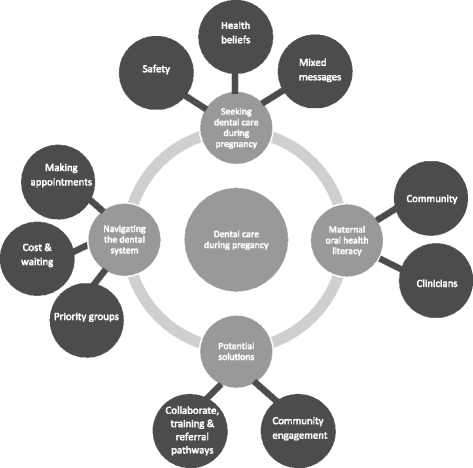'We are all scared for the baby': promoting access to dental services for refugee background women during pregnancy
- PMID: 26794243
- PMCID: PMC4722780
- DOI: 10.1186/s12884-015-0787-6
'We are all scared for the baby': promoting access to dental services for refugee background women during pregnancy
Abstract
Background: Vulnerable populations such as people with refugee backgrounds are at increased risk of poor oral health. Given that maternal characteristics play a significant role in the development of dental caries in children, antenatal care offers an opportunity to both provide information to women about the importance of maternal oral health and accessing dental care. Although pregnant women are recognised for 'priority' care under Victorian state-government policy, rarely do they attend. This study aims to describe Afghan and Sri Lankan women's knowledge and beliefs surrounding maternal oral health, barriers to accessing dental care during pregnancy, and to present the perspectives of maternity and dental service providers in relation to dental care for pregnant women.
Methods: One agency comprising both dental and maternity services formed the setting for the study. Using participatory methods that included working with bicultural community workers, focus groups were conducted with Afghan and Sri Lankan refugee background participants. Focus groups were also completed with midwives and dental service staff. Thematic analysis was applied to analyse the qualitative data.
Results: Four community focus groups were conducted with a total of 14 Afghan women, eight Sri Lankan women, and three Sri Lankan men. Focus groups were also conducted with 19 dental staff including clinicians and administrative staff, and with ten midwives. Four main themes were identified: perceptions of dental care during pregnancy, navigating dental services, maternal oral health literacy and potential solutions. Key findings included women and men's perception that dental treatment is unsafe during pregnancy, the lack of awareness amongst both the midwives and community members of the potential impact of poor maternal oral health and the overall lack of awareness and understanding of the 'priority of access' policy that entitles pregnant women to receive dental care cost-free.
Conclusion: This study highlights a significant policy-to-practice gap which if not addressed has the potential to widen oral health inequalities across the life-course. Stakeholders were keen to collaborate and support action to improve the oral health of mothers and their infants with the over-riding priority being to develop inter-service relationships to promote seamless access to oral health care.
References
-
- Chan KM, King NM, Kilpatrick NM. Can infants catch caries? A review of the current evidence on the infectious nature of dental caries in infants. N Z Dent J. 2005;101(1):4–11. - PubMed
MeSH terms
LinkOut - more resources
Full Text Sources
Other Literature Sources
Medical
Miscellaneous


